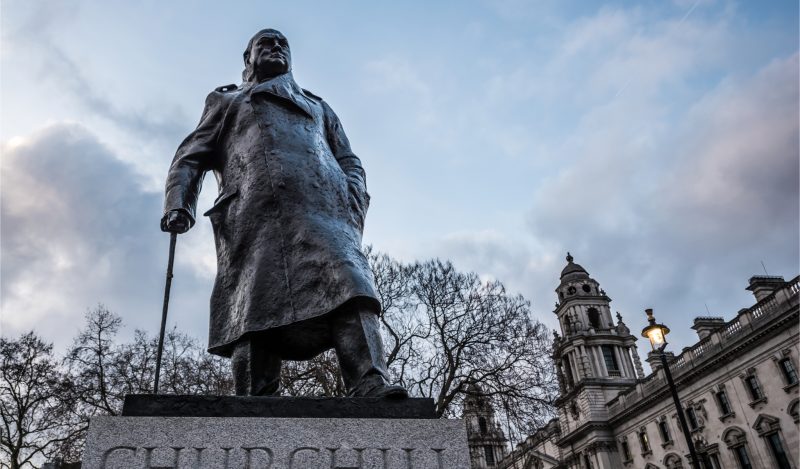Consider these words from Franklin D. Roosevelt’s 1933 inaugural address to Americans.
“Let me assert my firm belief that the only thing we have to fear is fear itself—nameless, unreasoning, unjustified terror which paralyzes needed efforts to convert retreat into advance.”
Roosevelt went on to state that happiness “lies in the joy of achievement, in the thrill of creative effort” and pledged to put people to work. His speech rang with courage and optimism. It inspired and united. Almost a century later it hasn’t lost its power.
The same grandeur infused Winston Churchill’s famous report to the House of Commons on June 4, 1940. “We shall fight on the beaches, we shall fight on the landing grounds, we shall fight in the fields and in the streets, we shall fight in the hills,” he proclaimed. The speech thrums with specificity, its rolling waves of “we shall fight” lifting it to the realm of poetry.
In support of a very different cause—equality for women—UK political activist Emmeline Pankhurst electrified the residents of Hartford, Connecticut with her “freedom or death” speech of November 1913. “Human life for us is sacred, but we say if any life is to be sacrificed it shall be ours,” she said. “We won’t do it ourselves, but we will put the enemy in the position where they will have to choose between giving us freedom or giving us death.” Women’s rights mattered enough to Pankhurst that she was prepared to raise the stakes to life itself.
The Covid-19 pandemic is an epochal, planetary event, but speeches of this caliber have gone AWOL during the crisis. Where have the modern-day Churchills and Pankhursts been hiding? Why have none of our leaders found the words to elevate and inspire us, to send shivers up our spines? Instead of inspiration, we’ve been served platter after platter of banalities, self-righteous admonitions, or outright incoherence.
An embarrassment of words
Let’s start with Donald Trump. I suspect that even his most ardent supporters would not count oration among his strengths. This string of words, which flowed from his lips in July 2020, typifies what he had to say about Covid during his presidential tenure:
“We’re gonna beat it, yeah. We’re going to beat it. And with time, you’re going to be it — time. You know, I say, it’s going to disappear. And they say, ‘Oh, that’s terrible.’ He said — well, it’s true. I mean, it’s going to disappear. Before it disappears, I think we can knock it out before it disappears.”
I rest my case.
Not that Joe Biden wins any points for Covid discourse. Here’s a tidbit from his September 9, 2021 speech about America’s progress in fighting the pandemic:
“Even as the Delta variant 19 [sic] has — COVID-19 — has been hitting this country hard, we have the tools to combat the virus, if we can come together as a country and use those tools. If we raise our vaccination rate, protect ourselves and others with masking and expanded testing, and identify people who are infected, we can and we will turn the tide on COVID-19.”
The rest of his speech offered more of the same: get vaccinated, follow the rules, do the right thing. While more or less grammatical, his sentences failed utterly to surprise or inspire.
Let us now turn to Boris Johnson, who pounded the same drum in his speech of July 19, 2021, the UK’s designated Freedom Day.
“Though we can see the enthusiasm of millions of young people to get their jabs, we need even more young adults to receive a protection that is of immense benefit to your family and friends – and to yourselves. And so I would remind everybody that some of life’s most important pleasures and opportunities are likely to be increasingly dependent on vaccination.”
Like innumerable other statements of its kind, Boris’s speech never rose from the tactical to the transcendent.
In Canada, meanwhile, prime minister Justin Trudeau evidently drew inspiration from the prepubertal set when he described Covid-19 as a “global pandemic that really sucks” in a fall 2020 address. A master of the sappy cliché, Trudeau could not resist shoehorning “we will get through this” and “better days are ahead” into the speech. Churchill would not have approved.
It gets worse. During a December 2021 television interview, Trudeau painted “the unvaccinated” with a single angry brushstroke: “They don’t believe in science/progress and are very often misogynistic and racist.” Coming from the dude who slathered dark paint on his face at more than one costume party, the accusation drips with unintended irony.
French president Emmanuel Macron apparently uses the same playbook as Trudeau, combining preteen language with a scolding finger in a January 2022 interview with Le Parisien: “As for the non-vaccinated, I really want to piss them off. And we will continue to do this, to the end. This is the strategy.” Gotta give the guy points for candor, if nothing else.
Speaking of puerile comportment, Israeli prime minister Naftali Bennett and his predecessor, Benjamin Netanyahu, saw fit to slam each other’s pandemic policies in a July 2021 session of the Knesset plenum. “We are succeeding in fixing what you abandoned,” Bennett said. “How did you succeed in destroying so much in such a short time in the struggle against corona?” Netanyahu shot back. During a crisis of Covid’s magnitude, one might hope that political leaders would model the collaboration they expect from their constituents, but scoring political points evidently ruled the day.
This lack of eloquence from our political leaders, while disappointing, should come as no surprise. From the start of the pandemic, public health advisors have pulled the strings. The politicians just did their bidding, reaching for such meaningless cliches as “Follow the science” to support their decisions.
Lacking the big-picture thinking and inner convictions to make tough calls, our ostensible leaders let themselves be pushed around by scientists whose ideas they did not understand. Nor did they have the guts to balance them with other measures of societal health. Mix in the fear of angering the Twitter mob and you get a recipe for timid, uninspired orations.
Missed opportunities
An analysis of speeches made by heads of state during the pandemic, published in the British Journal of Medicine in 2021, uncovered five primary themes across a total of 122 speeches: social welfare and vulnerable populations, responsibility and paternalism, nationalism, economics and financial relief, and emotional appeals. By and large, the speakers focused on the ravages of the virus and the need to save lives, but glossed over the harms of freeze-framing the activities of living. They promised financial relief, but didn’t acknowledge the loss of dreams that accompanies a business closure or an aborted concert tour. They offered support for declining mental health, without naming its source.
Above all, they told people to be scared: “Act like you have COVID-19,” said Jacinda Ardern, New Zealand’s prime minister, as her country headed into its first lockdown. “Every move you then make is a risk to someone else.” Over in Australia, Victoria premier Dan Andrews cranked up the volume even higher in an August 2020 tweet: “This virus is wicked. It doesn’t discriminate. It does not stop. And young or old—its impacts are brutal and potentially life-long.” The assertion that the “virus doesn’t discriminate” flies in the face of Covid-19’s clearly segmented risk profile, making it hard to avoid the conclusion that Andrews was gratuitously whipping up fear. It’s fair to say that he and other leaders failed at one of their critical functions: maintaining calm.
So many speeches, so many blunders. So many missed opportunities.
Good speakers imbue their listeners with calm and courage. They invite people to act together, while recognizing that each individual faces different circumstances. They don’t shame people for having human needs. They don’t scapegoat certain groups. Above all, they confront hard realities. They understand that you can’t have it all in a crisis, and to pay Peter you may have to rob Paul. They say the quiet parts out loud.
Ronald Reagan ticked these boxes when he gave his address to the [US] nation following the explosion of the Challenger space shuttle in 1986. While grieving the loss of life, he stepped boldly into the morally fraught terrain of tradeoffs. “I know it is hard to understand,” he said, addressing the schoolchildren of America, “but sometimes painful things like this happen. It’s all part of the process of exploration and discovery. It’s all part of taking a chance and expanding man’s horizons. The future doesn’t belong to the fainthearted; it belongs to the brave.” Living boldly carries a risk, he told his country, but it also gives life its deepest meaning.
Among today’s world leaders, Angela Merkel, Germany’s recently retired chancellor, probably came closest to hitting such nuanced notes. At the beginning of the pandemic, she gave a national speech that acknowledged the moral complexity of the decision to lock down a country: “Allow me to assure you that, for someone like me, for whom the freedom of travel and the freedom of movement were a hard-fought right, such restrictions can only be justified if they are absolutely imperative. These should never be put in place lightly in a democracy and should only be temporary. But they are vital at the moment in order to save lives.”
But Merkel’s wide-angle view contracted over the course of the pandemic. “I once again emphatically ask you to take this tricky virus seriously,” she said in her final podcast before leaving office at the end of 2021. She went on to thank “those who are reasonable and understanding in this difficult period [and] stick to the rules to protect themselves and take care of others.”
Merkel’s admonitions—take the virus seriously, follow the rules—may have hit the mark in early 2020, but on the cusp of 2022 they sounded tired and churlish. As she stepped off the world stage, she missed an important opportunity to reflect on the morally complex tension between risks and benefits or to offer a more sustainable vision as the virus eases into endemicity.
After two years of divisive and finger-pointing rhetoric from our elected leaders, we need a shift not only in policy, but in prose. We need leaders to deliver the sorts of brave and towering orations that have carried countries through major social upheavals in times past. We need words that boldly confront the dilemmas exposed by the pandemic: the balance between life and living, between collective sacrifice and individual needs, between respect for a virus and a paralyzing fear of it. There’s little reason to believe such words are forthcoming, but one can hope.
Join the conversation:


Published under a Creative Commons Attribution 4.0 International License
For reprints, please set the canonical link back to the original Brownstone Institute Article and Author.









